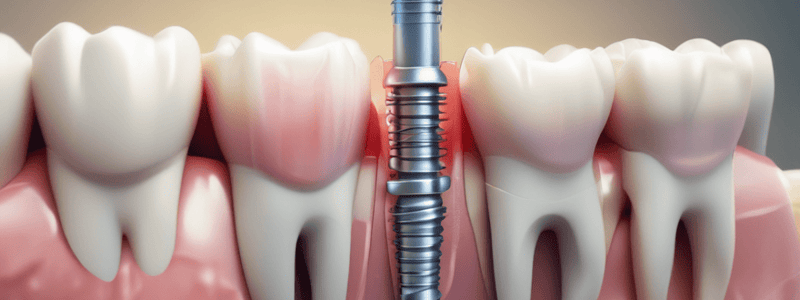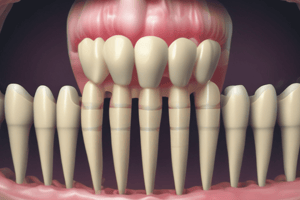Podcast
Questions and Answers
MTA is not used in area open to ______ environment
MTA is not used in area open to ______ environment
oral
MTA is not recommended for obturation of ______ teeth
MTA is not recommended for obturation of ______ teeth
primary
MTA has a ______ of discoloration potential
MTA has a ______ of discoloration potential
presence
Biodentine is the first all-in-one, ______ and bioactive material
Biodentine is the first all-in-one, ______ and bioactive material
MTA is not used as a ______ filling due to low compressive strength
MTA is not used as a ______ filling due to low compressive strength
Mineral trioxide aggregate (MTA) is comprised primarily of ______ % Portland cement.
Mineral trioxide aggregate (MTA) is comprised primarily of ______ % Portland cement.
MTA is the most commonly recommended material for sealing communications between the ______ canal system and the periodontium.
MTA is the most commonly recommended material for sealing communications between the ______ canal system and the periodontium.
Bismuth oxide and calcium sulfate dihydrate are added to MTA to enhance its ______ properties.
Bismuth oxide and calcium sulfate dihydrate are added to MTA to enhance its ______ properties.
There are two types of MTA, Gray and ______.
There are two types of MTA, Gray and ______.
Dr. Mahmoud Torabinejad developed MTA for use as a ______ root repair material.
Dr. Mahmoud Torabinejad developed MTA for use as a ______ root repair material.
MTA sets in the presence of ______ and has a setting time of around 2 hours and 45 minutes.
MTA sets in the presence of ______ and has a setting time of around 2 hours and 45 minutes.
MTA is a ______ material with good sealing ability and generates little or no inflammatory response.
MTA is a ______ material with good sealing ability and generates little or no inflammatory response.
The ______ strength of MTA develops over a period of 28 days and is more than 133MPa.
The ______ strength of MTA develops over a period of 28 days and is more than 133MPa.
The ______ of MTA is increased in the presence of moisture and a moistened cotton pellet should be placed in contact with MTA before placement of the permanent restoration.
The ______ of MTA is increased in the presence of moisture and a moistened cotton pellet should be placed in contact with MTA before placement of the permanent restoration.
MTA has a long ______ time with less shrinkage, according to Torabinejad et al.
MTA has a long ______ time with less shrinkage, according to Torabinejad et al.
What is the preferred option when the coronal pulp tissue is inflamed and direct pulp capping is not suitable?
What is the preferred option when the coronal pulp tissue is inflamed and direct pulp capping is not suitable?
What makes biodentine a preferred material for perforation repair in the root canal or pulp chamber floor?
What makes biodentine a preferred material for perforation repair in the root canal or pulp chamber floor?
What is the role of calcium silicate cements in bone tissue repair?
What is the role of calcium silicate cements in bone tissue repair?
What is the outcome of proper regenerative endodontic treatment with biodentine in necrotic immature teeth, according to Cauwels et al.?
What is the outcome of proper regenerative endodontic treatment with biodentine in necrotic immature teeth, according to Cauwels et al.?
What are the benefits of biodentine in apexification, as mentioned in the text?
What are the benefits of biodentine in apexification, as mentioned in the text?
What is a key consideration when placing a filling material in a cavity that bears occlusal pressure?
What is a key consideration when placing a filling material in a cavity that bears occlusal pressure?
What is the purpose of adding bismuth oxide to MTA?
What is the purpose of adding bismuth oxide to MTA?
What is one clinical indication for using MTA?
What is one clinical indication for using MTA?
What is the thickness of the MTA apical plug in apexification?
What is the thickness of the MTA apical plug in apexification?
What is the purpose of using a damp cotton pellet in MTA manipulation?
What is the purpose of using a damp cotton pellet in MTA manipulation?
What is the primary goal of apexogenesis, and how long does it take for apical closure to occur?
What is the primary goal of apexogenesis, and how long does it take for apical closure to occur?
What are the drawbacks of using formocresol in pulpotomy, and why is MTA a preferred alternative?
What are the drawbacks of using formocresol in pulpotomy, and why is MTA a preferred alternative?
What is the significance of the width of the periodontal ligament space in assessing healing of periapical lesions?
What is the significance of the width of the periodontal ligament space in assessing healing of periapical lesions?
What is the role of MTA in pulpotomy, and how does it differ from formocresol in terms of procedure time?
What is the role of MTA in pulpotomy, and how does it differ from formocresol in terms of procedure time?
What is the significance of a 'moist cotton pellet' in the MTA pulpotomy procedure?
What is the significance of a 'moist cotton pellet' in the MTA pulpotomy procedure?
What is the potential of Biodentine in revolutionizing the different aspects of managing primary and permanent teeth in endodontics as well as operative dentistry?
What is the potential of Biodentine in revolutionizing the different aspects of managing primary and permanent teeth in endodontics as well as operative dentistry?
What is required to extend the future scope of Biodentine regarding clinical applications?
What is required to extend the future scope of Biodentine regarding clinical applications?
What is Biodentine being investigated as a replacement material for in dental applications?
What is Biodentine being investigated as a replacement material for in dental applications?
What properties of Biodentine make it a promising material for use in endodontics and operative dentistry?
What properties of Biodentine make it a promising material for use in endodontics and operative dentistry?
What is the significance of compressive strength in the evaluation of Biodentine's performance as a dental material?
What is the significance of compressive strength in the evaluation of Biodentine's performance as a dental material?
Flashcards are hidden until you start studying
Study Notes
MTA Overview
- MTA (Mineral Trioxide Aggregate) is not suitable for areas exposed to the oral environment.
- Not recommended for obturation of primary teeth due to longevity and structural concerns.
- MTA has a significant potential for discoloration, particularly in aesthetic areas.
- It is composed primarily of 75-80% Portland cement.
- MTA is often used for sealing communications between the root canal system and the periodontium.
- Bismuth oxide and calcium sulfate dihydrate are additives that enhance radiopacity and properties of MTA.
- Two types of MTA exist: Gray and White.
- Developed by Dr. Mahmoud Torabinejad for root repair applications.
- Sets in the presence of moisture, with a setting time of approximately 2 hours and 45 minutes.
- Exhibits a biocompatible nature, with good sealing ability and minimal inflammatory response.
- Compressive strength exceeds 133 MPa after 28 days.
- MTA’s hydration and strength increase with moisture, requiring placement of a damp cotton pellet before permanent restoration.
Biodentine Characteristics
- Biodentine is characterized as the first all-in-one, bioactive material suitable for various dental applications.
- Preferred for perforation repair due to its quick setting time and favorable properties.
- Needs further investigation to broaden its clinical applications, especially as a replacement for materials like MTA.
Clinical Applications and Considerations
- In cases where the coronal pulp tissue is inflamed and direct pulp capping is not viable, alternative treatments should be considered.
- Properties of calcium silicate cements play a role in enhancing bone tissue repair.
- Outcomes in necrotic immature teeth treated with biodentine have shown promising regenerative endodontic results.
- In apexification, biodentine offers benefits such as biocompatibility and effective sealing ability.
- When placing a filling material in cavities under occlusal pressure, it's crucial to consider the material’s compressive strength.
MTA Usage and Comparisons
- The addition of bismuth oxide to MTA improves its radiopacity for better visualization.
- MTA serves specific clinical indications, such as root repair and pulpotomy.
- The recommended thickness for an MTA apical plug during apexification varies based on clinical guidelines.
- Utilizing a damp cotton pellet during MTA manipulation is essential for hydration, ensuring proper set and performance.
- Apexogenesis aims to facilitate apical closure, which typically takes several months, ensuring vitality of the pulp.
- Compared to formocresol in pulpotomy procedures, MTA offers a more favorable safety profile despite longer procedure times.
- Assessing the width of the periodontal ligament space is significant for understanding healing in periapical lesions.
Revolutionary Potential of Biodentine
- Biodentine has potential to revolutionize management techniques in both primary and permanent teeth across endodontics and restorative dentistry.
- Expansion of Biodentine’s clinical application is required for broader acceptance in dental practices, particularly in regenerative procedures.
- Its promising properties enhance both endodontic and operative dentistry outcomes.
- Evaluating compressive strength is vital in determining Biodentine's efficacy as a reliable dental material.
Studying That Suits You
Use AI to generate personalized quizzes and flashcards to suit your learning preferences.



